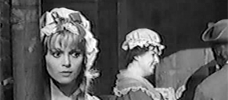Reviews
Memoirs of a Woman of Pleasure
Russ Meyer
UK, 1964
Credits
Review by Megan Weireter
Posted on 27 August 2008
Source bootleg DVD
Categories Bosomania!: The Sex, the Violence, and the Vocabulary of Russ Meyer
Readers, let us never pigeonhole Russ Meyer as merely a breast-obsessed maker of soft core films. Once upon a time, Meyer made a film the whole family can enjoy, in which a lovably dimwitted, B-cupped country girl named Fanny Hill finds love while retaining her virtue. You could practically take the kids to this one—just hope they don’t ask too many questions.
Fanny Hill is a little bit of an oddity for Meyer, maybe even an experiment: a period piece, and an attempt at broad, straight comedy that owes a heavy debt to vaudeville, as well as eighteenth-century novels of virtue and their contemporary parodies. There are actually some superficial similarities between Fanny Hill and Samuel Richardson’s Clarissa (published in 1748), and just to drive home the point, many edits are literally done as turns of pages interspersed with old engraved illustrations.
So let’s sit down and read the history of our young miss, an impoverished naïve country girl and recent orphan who’s just moved to the big city. But first, let’s watch as a grumpy high-society lady falls down, then trips over a pig, then gets dirty water splashed on her! Yes, the mood is established pretty much straightaway with a few good larfs. Anyway, little luckless Fanny begins the film by trying to find work somewhere, and lucks into catching the eye of Mrs. Brown, who immediately sees Fanny for the virtuous girl that she is and offers her a vague job as a “companion.” It turns out that Mrs. Brown runs a brothel full of Russ Meyer’s finest, all of whom, when they’re not bringing in the cash, lounge around scantily clad in not-very-much period clothing. Mrs. Brown sees that Fanny’s status as the house virgin will make her a lot of money, so she keeps Fanny as innocent as possible, explaining to her that these other girls are all distant relations.
That gets us through the first few minutes. What follows are the travails of Fanny as she gets sold off to various customers of Mrs. Brown’s, though always unsucessfully. Fanny manages to avoid all potential clients through her sheer sweetness and credulity, as well as a series of accidents. Men who pursue Fanny are more likely to end up falling face-down into a gigantic trifle, slipping and watching their wig fly off into a fireplace, or having a chandelier fall on their heads than they are likely to get any action.
On one adventure, Fanny and the other girls in the house all set out for a garden party with a crowd of sailors freshly home from a naval victory. In a scene that literalizes her blindness to what is actually going on, Fanny plays Blind Man’s Bluff, stumbling around blindfolded through throngs of couples rolling around on the grass. (I swear I’ve seen this same scene in an episode of The Benny Hill Show.) Somehow she falls into a river, but luckily is rescued by a handsome young sailor who, fortunately, is also just as virtuous as Fanny is.
A rainstorm starts up, and the two of them find shelter snuggled tightly into a haystack. Their little courtship scene here provides some of the best dialogue. “You have a marvelous configuration of your musculature,” Fanny awkwardly notes as she leans in closer. It’s here when things get really interesting. “I felt a movement! I think,” she intones solemnly, “that there might be a mouse in this haystack.” The sailor’s face grows white with nerves. It really has to be seen to be believed.
After sharing such an intimate moment, of course these two need to get married, so they attempt ask Mrs. Brown’s permission. But Mrs. Brown still hasn’t made any money off of Fanny, and she’s not ready to part with her yet. The sailor is summarily dispatched. But when Mrs. Brown finally crosses the line with Fanny in her attempt to rake in the cash, you can bet that sailor will show up to save her at the last minute. You can also bet that sailor will show up dressed as a woman. And that there will be midgets. And fishwives. And a St. Bernard. And you know you can bet there’ll be a series of misunderstandings. But in the end, all ends well, as of course it must.
Unsurprisingly, Fanny Hill succeeds grandly as a vaudeville. It’s loaded with slapstick and top-notch physical comedy, all expertly edited and musically scored for maximum comedic value. The randy puns and double entendres fly by so quickly it would take a few viewings to even catch every joke. This film is so good at being what it is, that I think if he’d wanted to, Meyer could have made a name for himself directing movies like this forever—although we’re probably better off that he didn’t.
What makes Fanny Hill so interesting in Meyer’s body of work is how well it plays it straight. Although all the playfulness, the fun with editing, and the unceasing devotion to the hilarity of moral turpitude mark it unmistakably as a Meyer film, there’s nothing particularly campy here—it’s remarkably old-fashioned, though no less enjoyable for being so. Watching Fanny Hill is like watching an eighteenth-century version of a Three’s Company episode. Because it’s a period piece, no one’s talking about sex overtly—they’re making vague innuendoes, which is how Fanny remains in the dark for the entire film, and how so any Three’s Company-esque hilarious misunderstandings can take place. Just as you would watching that show, you’ll groan, and you’ll giggle, and your more delicate friends might say, “Oh, he did not just say that!,” and in the end you’ll be left entirely entertained.
More Bosomania!: The Sex, the Violence, and the Vocabulary of Russ Meyer
-

The Immoral Mr. Teas / Eve and the Handyman
1959 / 1961 -

Lorna
1964 -

Fanny Hill
1964 -

Mudhoney
1965 -

Faster, Pussycat! Kill! Kill!
1965 -

Motor Psycho
1965 -

Mondo Topless
1966 -

Common-Law Cabin
1967 -

Good Morning and… Goodbye!
1967 -

Finders Keepers, Lovers Weepers!
1968 -

Vixen!
1968 -

Cherry, Harry & Raquel!
1970 -

Beyond the Valley of the Dolls
1970 -

The Seven Minutes
1971 -

Black Snake
1973 -

Supervixens!
1975 -

Up!
1976 -

Beneath the Valley of the Ultravixens
1979
We don’t do comments anymore, but you may contact us here or find us on Twitter or Facebook.



